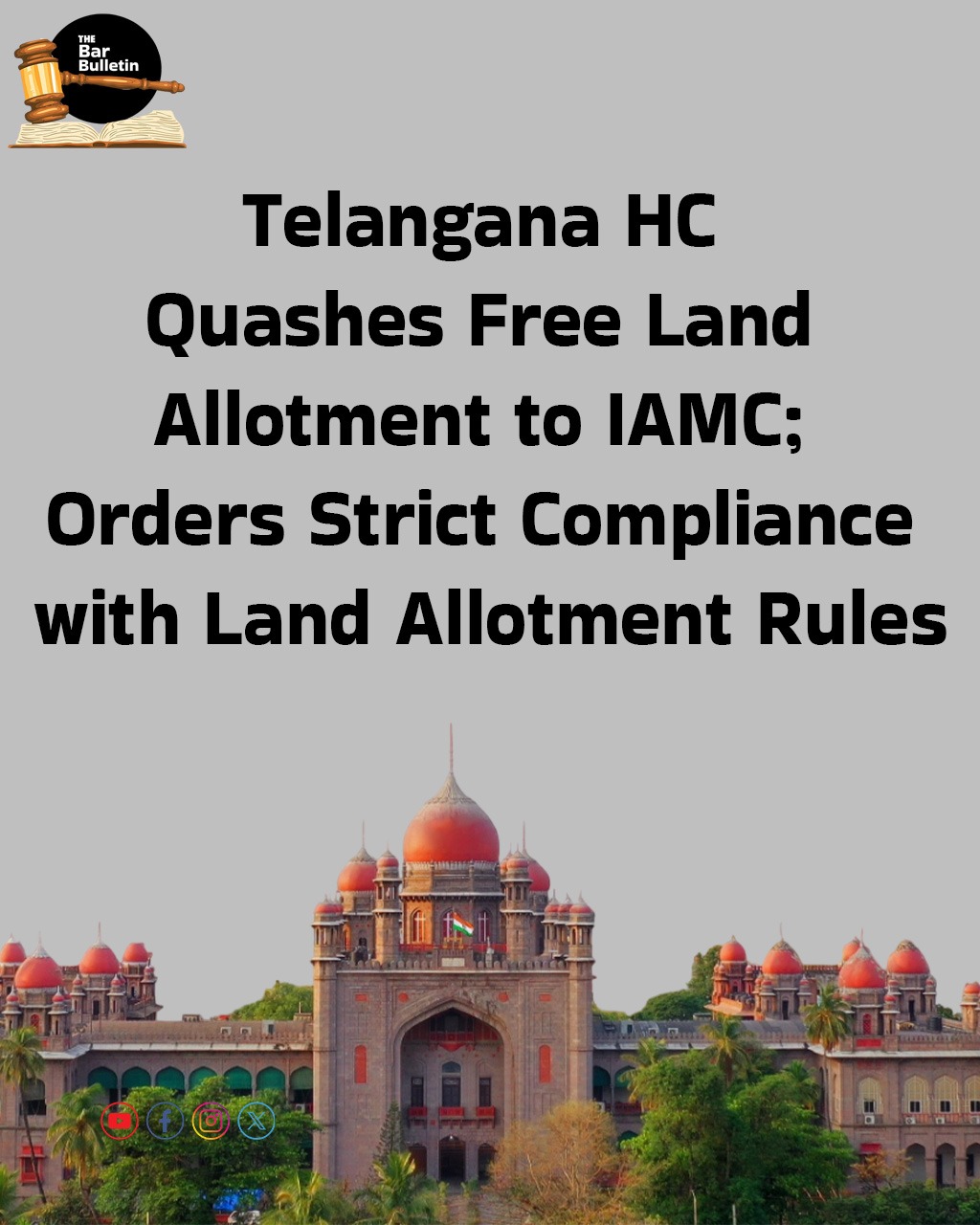The Telangana High Court quashed several government orders that had sanctioned the free allotment of prime land and financial assistance to the International Arbitration and Mediation Centre (IAMC), Hyderabad. The Court was hearing two public interest litigations (W.P. (PIL) Nos. 76 and 79 of 2023), filed respectively by Koti Raghunatha Rao (party-in-person) and A. Venkatarami Reddy, challenging the legality and constitutionality of the said government actions. The key challenge was to G.O. Ms. No. 126 dated 26.12.2021, by which the State allotted 3.70 acres of land at Raidurg village to IAMC without any monetary consideration.
The petitioners argued that IAMC, being a private trust and not a statutory body, was not entitled to receive public land free of cost. They pointed out that such actions violated statutory provisions including Rule 3 of the Andhra Pradesh (Telangana Area) Alienation of State Lands and Land Revenue Rules, 1975, which mandates collection of market value when allotting land to private entities. The petitioners further contended that IAMC was neither registered under the Companies Act at the time of allotment nor did it fulfill the public purpose criteria in the strict statutory sense. Concerns were also raised about the possibility of misuse of the allotted land, as the IAMC’s trust deed permitted its trustees to sell or otherwise deal with the trust’s assets.
The respondents, including the State Government and IAMC, defended the allotment by citing the recommendations of a 2017 high-level committee constituted by the Central Government to promote institutional arbitration in India. They submitted that IAMC was created as a not-for-profit public charitable trust with support from eminent public figures and constitutional functionaries, and that the allotment was in furtherance of public interest to promote alternative dispute resolution mechanisms. They also cited Section 25 of the Telangana Land Revenue Act, 1317 Fasli, to justify their authority to make such an allotment.
After examining the legal framework, including statutory rules and land policies, the High Court concluded that the land allotment was contrary to the applicable laws, particularly the 1975 Rules and the 2012 Government Land Allotment Policy. The Court emphasized that land, as a public resource, cannot be given away arbitrarily or without compensation unless expressly permitted by law for a demonstrable public purpose. It held that IAMC, being a private body, was ineligible for free allotment, and the required procedures for assessing and charging market value were not followed.
In addition, the Court invalidated G.O. Ms. No. 76 and G.O. Ms. No. 365, which had granted Rs. 3 crores annually in financial assistance to IAMC, and G.O. Ms. No. 6 dated 17.03.2022, which directed all State departments and PSUs to refer disputes over Rs. 3 crore exclusively to IAMC. It held that such directions created a monopoly in favor of a private institution, imposed financial burden on the exchequer, and lacked statutory backing. The Court reaffirmed that all executive actions must conform to statutory mandates and principles of fairness, transparency, and accountability.
The Court allowed the PILs and quashed the impugned government orders, directing the State to ensure that future allotments of land or financial aid adhere strictly to statutory provisions and are supported by demonstrable public interest.
For Petitioner Mr. Koti Raghuntha Rao, party-in-person in W.P. (PIL) No. 76 of 2023.
Mr. Satyam Reddy, learned senior counsel rep. Ms. K.V. Rajasree, learned counsel for the Petitioner in W.P. (PIL) No. 79 of 2023.
For Respondents Mr. A. Sudershan Reddy, learned Advocate General for R.1 to 3 in both the PILs.
Mr. D. Prakash Reddy, learned senior counsel rep. Mr. Mallipedi Abhinay Reddy, learned counsel for R.4 in W.P. (PIL) No. 76 of 2023.
Read Order
![]()



